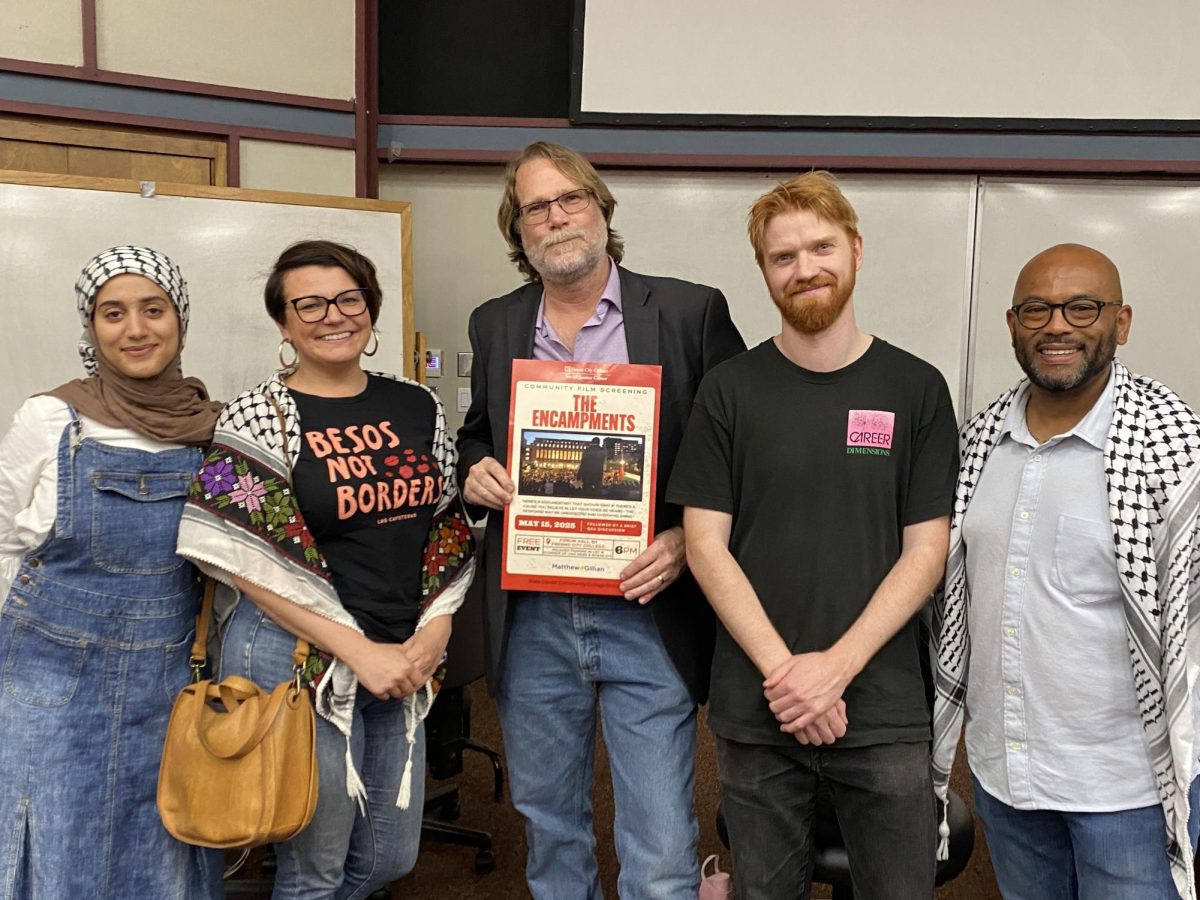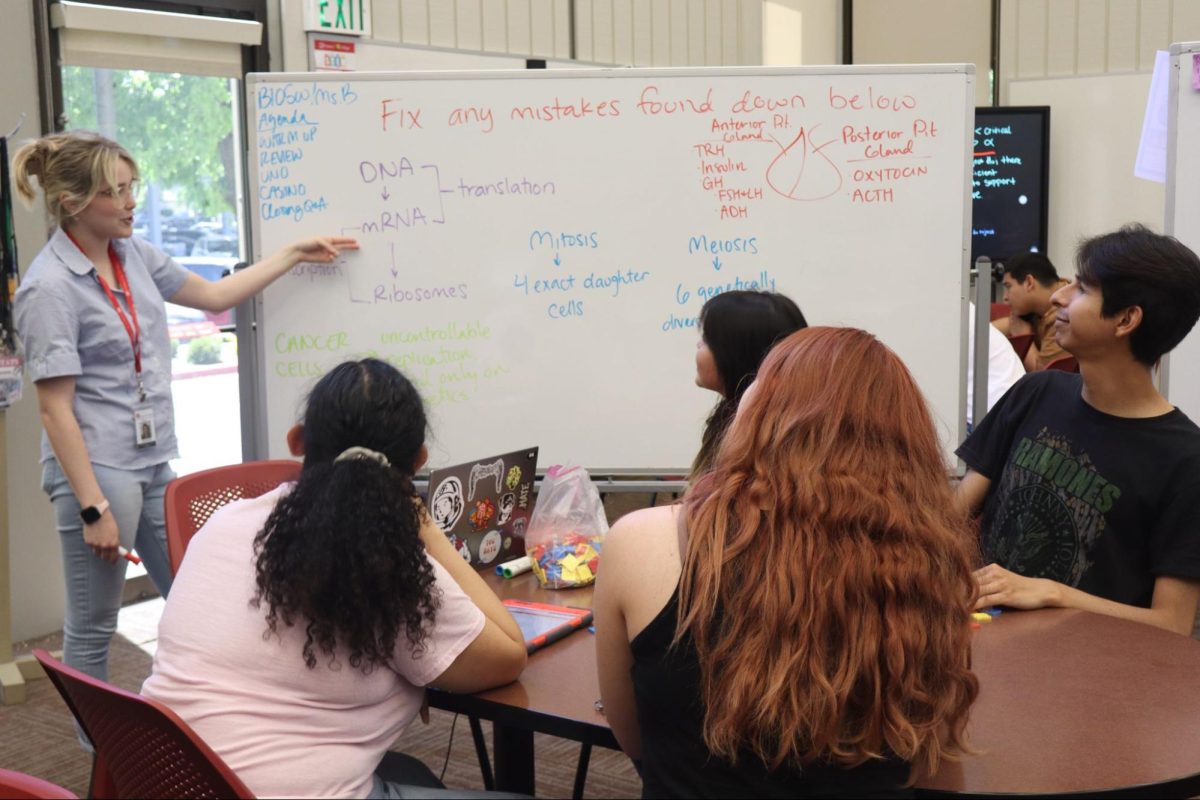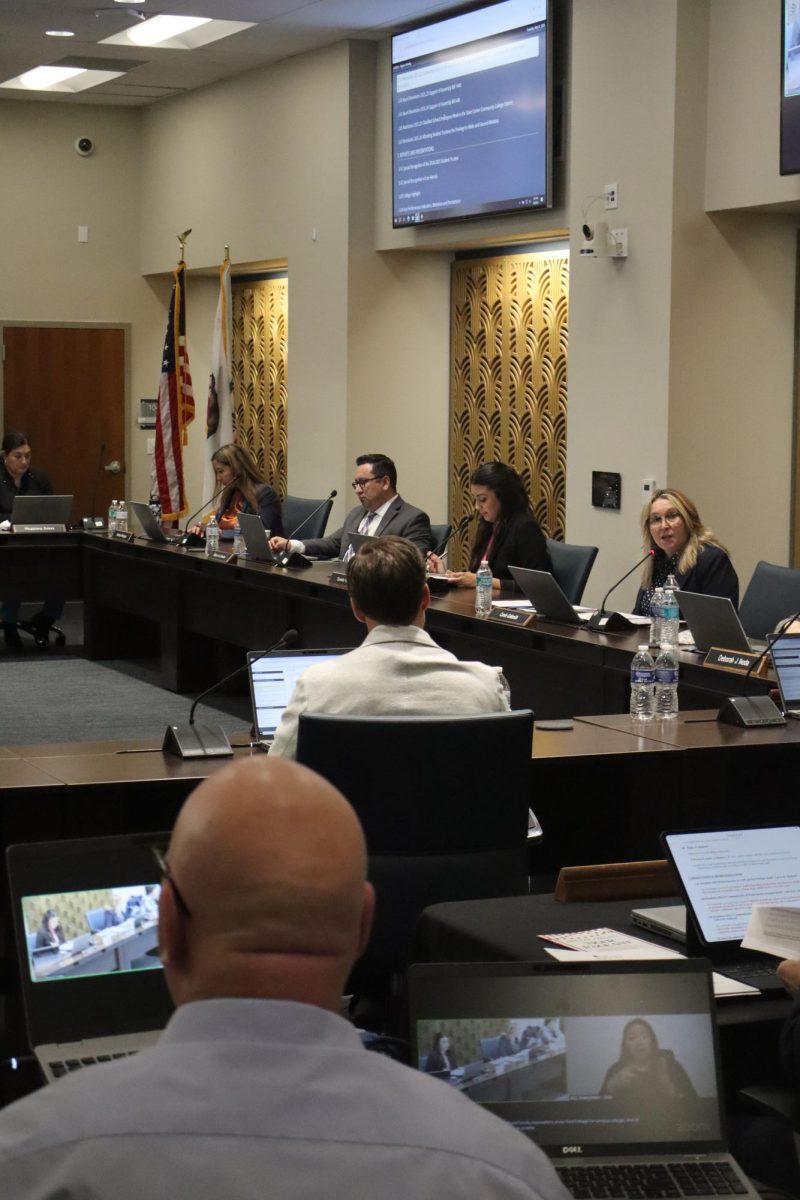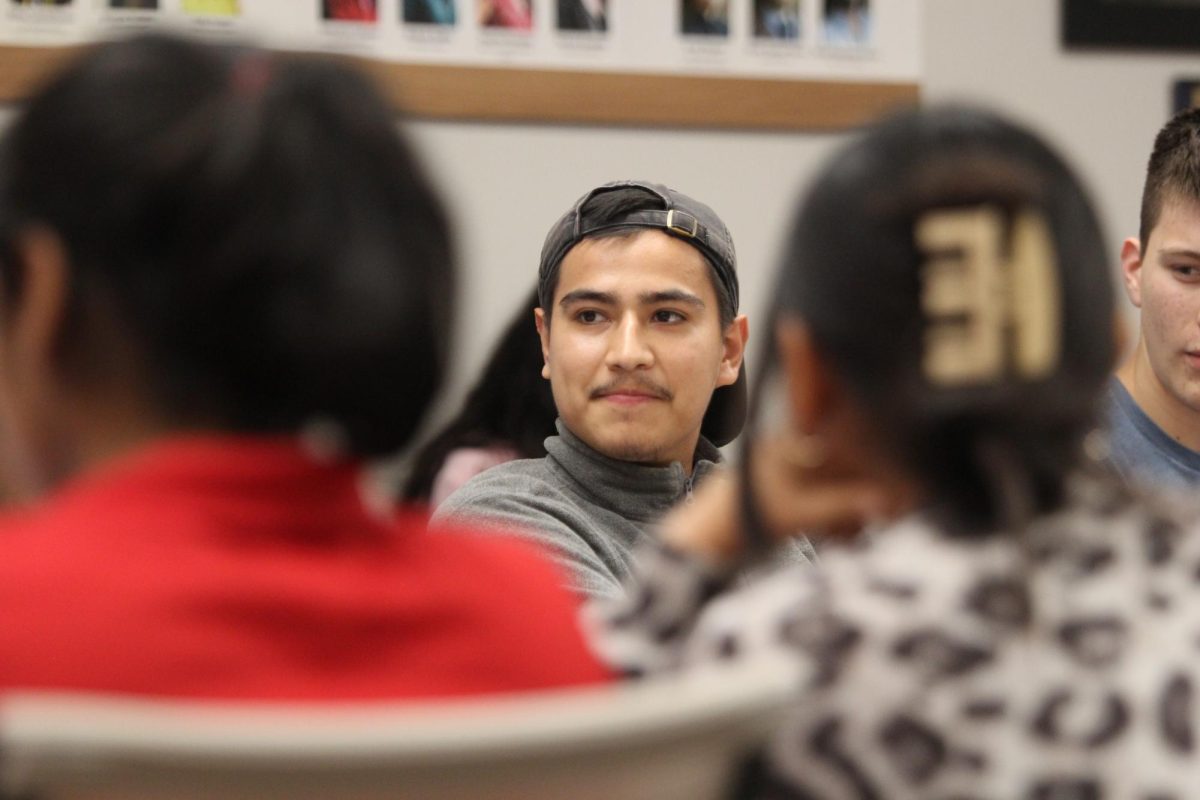Diane Diaz dropped her night class this past spring. She had been trapped in an elevator in the health sciences building twice. Because of the hardship of getting to her class, she decided the struggle wasn’t worth it. Diaz is paralyzed from the waist down and navigates through campus in a wheelchair. She is a student at Fresno City College and part of DSP&S program.
Amanda Alaniz has missed class multiple times this year because she is unable to open the doors to gain access to the building where her class is located. The door does not have any features to make it easier for the handicapped. Many times, she sits in her wheelchair waiting for someone to come along and help. She knocks on the door, but no one hears her. She feels that she cannot succeed in a class she’s unable to attend. Alaniz, a student at FCC, also uses a wheelchair as her main source of mobility.
Alaniz has cerebral palsy, and the left side of her body is weaker than her right side. When no one is there to help her, she tries to open doors, determined to make it to class. Using her right leg to prop the door open, Alaniz pushes the door with her right hand and maneuvers the wheelchair with her left hand.
“They are too heavy,” Diaz, who has a torn shoulder, said. Often times, Diaz and Alaniz are forced to wait outside of classrooms until someone opens the door for them.
Eddie Diaz, Diane Diaz’s son, sees their struggle. Eddie does not have a disability, but has spent time in a wheelchair to try to understand the everyday barriers his mother encounters. Of his mother’s struggles on the FCC campus, Eddie is discontent. “It’s not right,” he said.
Diane Diaz has returned to school after working in a law firm. This is her third semester, and she is working toward her degree in Alcohol and Drug Counseling. Alaniz is in her fourth year at FCC, focusing on a degree in business.
Janice Emerzian, Director of DSP&S for State Center Community College, works hard to advocate for and accommodate students with disabilities and to inform them of their rights. DSP&S is made up of over 2,300 students, and each student carries a story.
“My husband always tells me, no one really cares except you and your staff, but I like to think more people do,” Emerzian said.
The feeling of discontent among disabled students at FCC is widespread. In early September, Thomas and Sheila Gough attended an ASG meeting. At the meeting, the couple voiced a complaint about the lack of interpreters for the deaf population at FCC. Thomas is deaf; Sheila is not. They both attend FCC. Upon receiving the complaint, Daniel Gai, ASG President, said he felt obligated to investigate the issue.
Gai found that this year alone, the DSP&S budget was cut by 47 percent, which has impacted the number of interpreters DSP&S can hire. With fewer interpreters, more students who are hard of hearing are likely to drop their classes, and some already have. Gai is still asking questions about the issues DSP&S is facing.
Henry Garcia, president of the Abilities club on campus, is committed to fight for the rights of students with disabilities on campus. The Abilities club is a student organization created to raise awareness of persons with disabilities. Garcia welcomes every person on campus to the club, disability or no disability.
Garcia, who uses a walking cane, is a war veteran. He has a nerve disorder called peripheral neuropathy, post traumatic stress disorder, Tinnitus (causes a ringing in his ears), and trouble reading numbers (like dyslexia). He currently holds an associates degree in Alcohol and Drug Counseling, and is contemplating acquiring a degree to be a teacher’s aid for people with disabilities.
Garcia is dissatisfied with the amount of barriers he and members of the Abilities club meet on campus daily. Like most students with a disability, Garcia wants to be treated like everybody else; to be involved in student activities, school events, and the FCC student body, but he cannot. For instance, prior to FCC’s Centennial Convocation, Garcia was contacted by Diaz and Alaniz who were eager to attend the ceremony alongside of him. Garcia met the students at Wendy’s the day of the celebration, and proceeded to the event.
When the students arrived, they were surprised to see that no accommodations were made for students with disabilities. Alaniz, Garcia, and Diaz were given the run around by officials in charge of seating. After wheeling between the stage area and back entrance twice, they were seated. “These are people in wheelchairs that want to celebrate a college that doesn’t care about them,” said Garcia.
After they were seated, the students fought the harsh heat. “We’re in a wheelchair; they don’t realize that the body temperature rises in a wheelchair,” said Diane Diaz. Garcia suggested that a canopy, similar to the one set up for the special guests would have been an appropriate accommodation.
Garcia says the Convocation incident only illustrates the college’s ineffectiveness toward meeting disabled students’ needs. While the celebration symbolized a past of overcoming and thriving for FCC, for Garcia, it symbolized 100 years of discrimination. “Right now, as I see it, it’s not a community college, it’s not for everyone,” he said.
Sean Henderson, Director of College Activities, apologized for the lack of accommodations, said Garcia. The College Activities office was in charge of arranging event accommodations, while DSP&S was in charge of transporting students with disabilities to the event.
Mischelle Liscano, Vice President of The Abilities Club, explained, “As a human being, you want that feeling that I’m okay; I’m okay with this today” about living with a disability. Colleges have enormous potential to influence that feeling.
Garcia has decided to ask more of his college. He recently met with Dr. Villa, Vice President for Student Services, to discuss four requests the club is making. The requests are to grant the Abilities club the permission to provide games and food at Club Rush events for individuals who have a physical disability and a restrictive diet, like diabetes; to drive on campus to unload equipment for school events, and to address standing committees about accommodations for persons with disabilities for all upcoming events. Additionally, Garcia wants accommodations to be made for persons with disabilities at all college events.
Diane Diaz and Alaniz have volunteered to work with the authority on accommodation decisions. “I’m fine to be able to mention and show them how I get into certain places, and where it’s hard for us to get into,” Alaniz said.
Garcia told members of The Abilities club this past week that Dr. Villa is very supportive of most of the requests. Villa will present the requests to his co-workers and will update Garcia on whatever progress has been made.
Clifford Garoupa, The Abilities club advisor, said the students’ requests are reasonable. Garoupa has been teaching at FCC for over 20 years. He explains that with any kind of institution, there are problems concerning facilities, accommodations, and access to facilities.
The disabled are a traditionally excluded group, explained Garoupa. The Americans with Disabilities Act of 1990, a clear and comprehensive prohibition of discrimination on the basis of disability instituted by Congress, confirms this past. Historically, society has tended to isolate and segregate individuals with disabilities, and, despite some improvements, such forms of discrimination against individuals with disabilities continue to be a serious and pervasive social problem, according to the ADA.
“A better job can always be done, not just by this institution, but by all instituti
ons,” Garoupa said. He is confident that the college will work toward making the correct changes necessary. “This institution has its heart in the right place, and wants to do the right thing,” he said.
The college offers many accommodations to students with disabilities, such as classes for students with disabilities, testing accommodations and designated counselors. This spring, DSP&S will have a new, more accessible location and a classroom stationed in the Old Administration Building. Last week, DSP&S was granted money to help with recent budget cuts. Emerzian says that a specific amount is yet to be disclosed. Cynthia Azari, president of FCC, said she would like to see a day when FCC administration, staff, faculty, and students volunteer to spend a few hours in a wheelchair
“We love the campus; it’s just a few things, and it would be great,” said Diane Diaz. Tables without planted benches in the patio, where students in wheelchairs could join their friends for lunch, would be an additional improvement, Diaz also said.
She guided this reporter around the patio area of the cafeteria, pointing out lifts in the ground that make it hard for students in wheelchairs to navigate. “With a walker, you hit that, BOOM! Wheelchairs, you still have to go around it because you can hit that bump and tip easily,” she said. “But why should we have to go around?” her son, Eddie, asked. “She almost fell; I’ve had to catch her.”
Cynthia Azari, said the college is in the process of leveling out the uneven ground. “I think that we’re making an effort to do more than be minimally compliant,” Azari said. “We’re doing the best we can at this point.”






